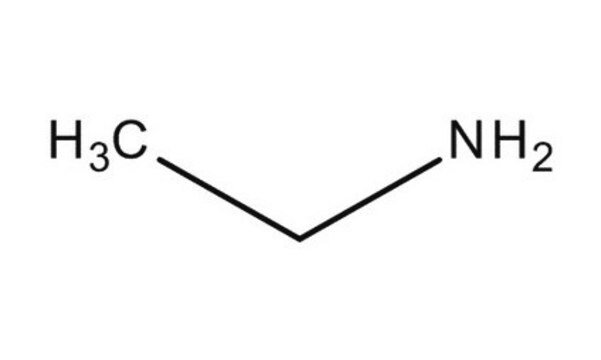395072
Ethylamine solution
2.0 M in THF
Synonym(s):
Aminoethane, Monoethylamine
About This Item
Recommended Products
vapor pressure
17.14 psi ( 55 °C)
4.82 psi ( 20 °C)
Quality Level
form
liquid
concentration
2.0 M in THF
density
0.81 g/mL at 20 °C
0.856 g/mL at 25 °C
functional group
amine
SMILES string
CCN
InChI
1S/C2H7N/c1-2-3/h2-3H2,1H3
InChI key
QUSNBJAOOMFDIB-UHFFFAOYSA-N
Looking for similar products? Visit Product Comparison Guide
Related Categories
General description
Application
- In amination reactions.
- To synthesize N-ethyl-4-hydroxybutanamide by reacting with γ-butyrolactone.
- To prepare an anthracene-based tripodal chemosensor for the selective detection of Zn(II) ions.
Ethylamine solution can also be used as a reaction medium in the synthesis of large-scale flower-like CuS microspheres using Cu(S2CNEt2)2 as a precursor.
Signal Word
Danger
Hazard Statements
Precautionary Statements
Hazard Classifications
Acute Tox. 4 Oral - Carc. 2 - Eye Dam. 1 - Flam. Liq. 2 - Skin Corr. 1B - STOT SE 3
Target Organs
Central nervous system, Respiratory system
Supplementary Hazards
Storage Class Code
3 - Flammable liquids
WGK
WGK 1
Flash Point(F)
-23.8 °F - closed cup
Flash Point(C)
-31 °C - closed cup
Personal Protective Equipment
Choose from one of the most recent versions:
Already Own This Product?
Find documentation for the products that you have recently purchased in the Document Library.
Customers Also Viewed
Our team of scientists has experience in all areas of research including Life Science, Material Science, Chemical Synthesis, Chromatography, Analytical and many others.
Contact Technical Service







